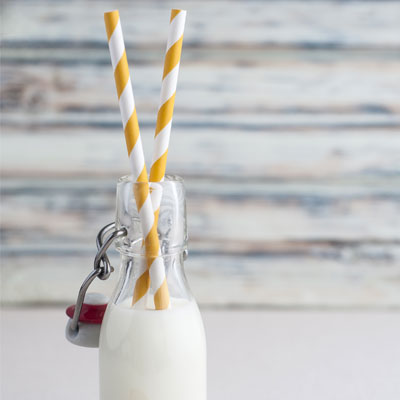 If you’re lactose-intolerant or have a milk allergy, if you’re a vegan or suffer from high cholesterol, or if you simply choose not to use cow’s milk, there’s an increasing number of alternatives available on store shelves.
If you’re lactose-intolerant or have a milk allergy, if you’re a vegan or suffer from high cholesterol, or if you simply choose not to use cow’s milk, there’s an increasing number of alternatives available on store shelves.
Non-dairy milks are produced using a cereal base like oats, rice or wheat; oil-rich nuts and fruits such as almond, coconut, and hazelnut; or pulses like soya or peanuts. They are mostly low in cholesterol, lactose, and casein, and full of vitamins (A, B, C, and E), minerals (calcium, potassium, magnesium, and phosphorus) and plenty of unsaturated fatty acids. They have different tastes and consistencies, and are suitable for different purposes.
Soy milk is made from a mixture of soybeans and water. With the closest nutritional profile to cow’s milk, it’s lactose-free, rich in calcium and protein, and contains no saturated fat. You can use it for baking, cooking, or for adding to cereal and hot drinks. Unflavoured soy milk has a distinct beany taste and a thin consistency; it’s the best non-dairy substitute if you’re making a sauce, as it remains stable at high temperatures. Several studies indicate that it could lower your risk for heart disease. However, some people are allergic to soy products, and research suggests that consuming large quantities could be harmful for pre-menopausal women and young children – soy contains phytoestrogens, which are oestrogen-mimicking compounds that can have an adverse effect on hormone health. For menopausal women, the isoflavones in soy could be beneficial.
Coconut milk can add creaminess, sweetness, and flavour to dairy-free cooking, and tastes delicious as is. It’s easily digested for those with lactose intolerance, and is rich in medium-chain fatty acids including lauric acid, which is antiviral and antibacterial and promotes brain development and bone health. Coconut milk contains fifty percent of your recommended daily allowance of vitamin B12, the vitamin that ensures red blood cells get enough oxygen to the body – particularly important for vegetarians and vegans who may not get enough B12 through diet alone. However, coconut milk is high in saturated fat, and commercial brands can contain salt, sugar and other additives.
Rice milk is usually made from unsweetened brown rice and is free from cholesterol, saturated fats, and lactose. Low in fat and kilojoules, it’s easy to digest and non-allergenic. It has a thin consistency and a naturally slightly sweet flavour, making it a good choice for using with cereal or in coffee. Rice milk contains silicium, which allows calcium and magnesium to “fix” properly – essential for bone and cartilage health. However, it is lacking in important nutrients, including vitamins A and C, and protein.
Almond milk is tasty and nutritious, containing high quantities of vitamins A, B, and E, calcium, iron, and magnesium, as well as a lot of fibre, and no cholesterol or lactose. It’s high in antioxidants and low in fat, but provides very little protein. Almond milk can be used in almost every way you would use cow’s milk. Some commercial almond milk products contain soy lecithin, so should be avoided if you’re allergic to soy.
Oat milk is made from oat groats, water, and other grains and beans. Some commercial varieties contain soybeans. Oat milk is thin in consistency and mild-tasting with a hint of sweetness, and provides fibre as well as a moderate amount of protein. It’s cholesterol-free and is high in vitamin E and folic acid; it also contains antioxidants in the form of phytochemicals that help prevent heart disease, stroke, and some cancers. It is high in sugar though, and people with gluten allergies can’t use it.
Stored in the fridge, in an airtight container, non-dairy milks will keep for the same length of time as an opened bottle of cow’s milk. Don’t freeze them, as that will change their consistency. Try a few of them to find the ones you like best; it’s a good idea to alternate different ones, to diversify nutritional supply to your body. If you’re buying commercial brands, check the labels for additives, and where possible choose organic – or make your own!
Other articles you may be interested in:
Good fats, bad fats
Veganise your diet
Detox delusion
Go green, get lean





21 Responses
Great article! Definitely going to try coconut milk!